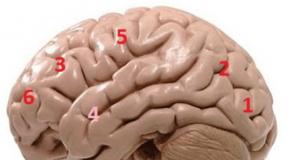In order of priority. Social housing. Extraordinary receipt of housing
Lists of citizens registered as needing residential premises will be published on the official websites of local governments of municipalities in the Moscow region annually no later than January 30, the press service reports.
The corresponding changes to the regional law “On the procedure for maintaining records of citizens as those in need of residential premises provided under social tenancy agreements” were made by the Moscow Regional Duma, the material explains.
The message notes that in order to promptly and timely fulfill this requirement, the Ministry of Construction Complex of the Moscow Region, in accordance with its powers in the field of housing policy, took the initiative to create a new subsection “Implementation of citizens' rights to housing” on the official website of each municipality. The Regional Ministry of Construction recommends posting in it lists of citizens who are registered and in need of residential premises, information on the number of residential premises received by the municipal housing stock, on the number of residential premises provided to citizens under social tenancy agreements and the rental of specialized residential premises, as well as information on the sale housing programs.
“At the same time, we ask you to pay special attention to compliance with the requirements of the law, citizens and the interests of citizens when forming these lists. I would like to note that citizens registered before March 1, 2005 retain the right to be registered until they receive housing under social tenancy agreements,” the message quoted the words of the Minister of the Regional Construction Complex Sergei Pakhomov.
Thus, three lists will be posted on the official websites of municipalities: a general list, which indicates all citizens who are not provided with housing and have been registered; a separate list of citizens entitled to priority provision of housing; as well as a separate list of citizens with the right to priority provision of housing. The list of “out-of-priority” and “first-priority” is formed from the general list in chronological order according to the date the citizen submitted an application for such a right and supporting documents, the release notes.
According to monitoring conducted by the Ministry of Construction Complex of the Moscow Region in 2016, records of those in need of housing are kept in more than 180 municipalities for 11 categories of citizens.
Currently, the government of the Moscow region is considering a draft law “On the procedure for keeping records of citizens as those in need of residential premises provided under social tenancy agreements.” A number of important changes will be made to the document in the near future, which relate to keeping records of citizens in electronic form. We are talking about creating a unified information system for registering citizens in need of residential premises in the Moscow region. This will make it possible to provide services to citizens through the provision of state and municipal services and create a “transparent queue”, as well as exercise control, including public control, over the activities of municipal authorities in terms of the distribution of residential premises coming into their ownership.
“Maintaining a “transparent queue” by local governments will reduce the likelihood of its violation and make the distribution of housing open and understandable for citizens,” the message concludes in the words of Sergei Pakhomov.
The following may be grounds for excluding military personnel or members of their families from the housing waiting list:
Illegal procedure for queuing for housing;
Availability of residential premises, both for the serviceman and his family members;
Availability of residential premises for use by both the serviceman and his family members;
Registration at the place of residence in a residential building, as a member of the family of the tenant of the housing or as a member of the family of the owner of the housing, which implies the use and provision of living quarters by the serviceman himself or his family members;
Intentional deterioration of living conditions (if five years have not passed since the intentional deterioration);
Dismissal of a serviceman not on a preferential basis with calendar service of more than 10 years, but less than 20 years;
Other grounds that provide the housing authority with the opportunity to exclude a military personnel from the lists of those in need of living space.
Our organization has positive experience in providing legal assistance to military personnel and members of their families in all of the above cases!
We are not an organization that speaks unfoundedly about its successes! We have extensive experience and positive judicial practice in every possible problem that arises for a serviceman and his family members. We are ready to share this practice with you! You have the opportunity to familiarize yourself with some court decisions on our website; we can provide other court decisions for your attention in our office!
If you have been excluded from the housing waiting list, there is no reason to despair! It is necessary to obtain clear, high-quality advice from a professional lawyer.
When military personnel contact us with a problem regarding exclusion from the waiting list, we offer several options for resolving this issue!
Of course, call us! Come to our office! We will not only provide you with competent advice on resolving the current circumstances, but also select court decisions to suit your problem, from which you yourself will understand that the court should be on your side!
Residential space is provided to citizens of the Russian Federation in a strict order of priority if they are registered as in dire need of housing or in need of improved housing conditions, in accordance with Article 33 of the Housing Code of the Russian Federation. Only special categories of citizens can receive housing out of turn due to their resettlement after various natural and man-made disasters. For example, a family is not on the waiting list for housing, but there is an earthquake or flood, as a result of which their existing housing has been destroyed or is in danger of collapse.
According to the same legislative norms of the Russian Federation, all citizens of the country who need improved housing conditions or who do not have permanent housing are recorded according to a single list. But on the basis of a single list, three separate lists are compiled: first-priority, non-priority and those on the list for receiving housing on a general basis.
This principle of priority cannot in any way be violated in favor of the needy, regardless of the degree of citizens’ need for housing and regardless of the personal merits of citizens. Citizens receive the right to provide housing at the moment in time when they register the documents submitted for housing.
According to amendments to the Housing Code of 1996, in case of violation of the rules of priority for obtaining housing, bailiffs may decide that the issued housing warrant is illegal. Institutions, organizations, local administration bodies (who are in charge of distributed residential premises) or a prosecutor acting in the interests of one of the parties can file a claim for violations of priority standards in obtaining housing.
It is noteworthy that citizens themselves do not have the right to file claims in court if they believe that their rights as people on the waiting list have been infringed. They can only act through a legal institution or local government. On the one hand, such legislative norms can be regarded as a restriction of the rights of citizens, but on the other hand, the law is the same for everyone and should not be violated. In fact, in judicial practice there are often cases when applications from citizens are nevertheless accepted and considered on an individual basis, based on the situation that has developed at a particular point in time.
In what cases are changes made to the waiting list of citizens for housing not in favor of those in need?
According to Article 34 of the Housing Code of the Russian Federation, changes in the waiting lists of citizens in need of housing can be made by local governments with a valid reason or by the administrations of enterprises/organizations (after coordination with the trade union committee).
For example, for malicious violations of labor regulations at an enterprise, a citizen may be “shifted” by several points on the waiting list for housing. But according to legislative norms, no one can exclude a person in need from the waiting list for housing, no matter what violations of discipline he is accused of (hooliganism, constant lateness to work, drunkenness, theft of property, if it does not entail the scale provided for by criminal law). code, etc.).
The administration of an enterprise has the right to change the priority of a citizen on the list for receiving real estate from the housing stock even for one serious offense. In fact, there are quite a lot of cases in which those on the waiting list for housing can be legally shifted from the general lists.
Which category of citizens of the Russian Federation has an extraordinary right to receive housing?
Citizens have the right to receive housing in the Russian Federation out of turn if they:
- Lost housing (public or government) due to a natural disaster.
- They were staying in a children's state institution and they reached the age of majority, and also if they were dependent on trustees, guardians or relatives and now, for a number of reasons, they cannot be returned the living space that their parents had.
- They were assigned as specialists to work in another region or region.
- Studied at a higher, vocational, secondary technical institution, graduate school, residency, etc.
- According to the Law on the Status of Judges in the Russian Federation, the local administration must provide housing to city judges within six months from the date the judge takes office. This means comfortable housing, if the judge did not have one in the locality. Extraordinary housing is also provided to employees of the prosecutor's office and district inspectors on the same conditions - within six months after taking office.
- Disabled people and citizens of retirement age, if they were treated in inpatient institutions, and then were discharged from these medical institutions and now need housing. They may be returned to their previous housing if it complies with sanitary living standards or is provided with another residential premises out of turn.
Which category of Russian citizens have priority rights to housing?
Based on Article 36 of the Housing Code of the Russian Federation, the following citizens can be included in the priority lists for housing:
- Disabled people of the Great Patriotic War and those participating in combat operations in defense of the Motherland and citizens of the Russian Federation (including employees of the Ministry of Internal Affairs, FSB and other military units).
- Families of those who disappeared or died during the Second World War and in other hostilities on the territory of Russia and beyond its borders. Dependents of these categories of citizens, their spouses, parents, disabled children, etc. are also considered members of such families.
- Heroes of Russia and the Soviet Union, Heroes of Labor, as well as persons who were awarded the Order of Labor Glory, the Order of Glory, the Order of three degrees “For Service to the Motherland in the Armed Forces”.
- Persons with severe forms of chronic diseases (a list of such diseases can be read in the corresponding article of the Housing Code of the Russian Federation). For example, it could be tuberculosis, severe bronchial asthma, psoriasis, severe mental illness, etc.
- Families whose relatives (spouses, parents) died in the performance of official or state duties, fulfilling their duty as a citizen of the Russian Federation, saving the lives of other citizens or protecting the law and order of the country.
- Disabled people of groups I and II who were injured during combat or in civilian operations, as well as as a result of congenital injuries or serious illnesses.
- Workers and employees of the housing and communal services sectors, social organizations, who have worked for a long time in the same field of production. Such citizens may receive priority rights to housing after a team meeting, at which an agreement is drawn up, signed by the administration of the organization or enterprise, as well as representatives of the trade union committee.
- Women who have received the title of “Heroine Mothers,” as well as families raising three or more minor children, single mothers and families in which twins, triplets, etc. were born.
- Rescuers from professional or community rescue teams.
- Teachers, doctors and other employees whose services are needed by local medical, health, general education, preschool and other institutions or enterprises in populated areas of the Russian Federation.
- The priority right to housing is given to police and customs officials.
- Persons affected by political and economic repression.
In fact, all of these above lists of those who are not on the priority list and those who are first-priority for housing or for improving living conditions are far from exhaustive. According to the Legislative norms of the Housing Code of the Russian Federation, there are other cases when citizens from the general list for housing can be moved to other categories of lists - first-priority and non-priority. Housing from the housing stock is distributed with the participation of the administration of settlements of the Russian Federation with the participation of trade union committees, as well as representatives of local enterprises, organizations, institutions, etc.
Housing scams for those on the capital's waiting list did not start today. To remind you of this once again, we publish a letter from a Sokolniki resident to one of the regional newspapers:
“I consider it necessary to touch upon the topic of waiting lists in the Sokolniki district. At meetings of the municipal assembly, I repeatedly raised the question of the Moscow Department of Housing Policy providing us with a waiting list. But deputy Krestovskaya, who illegally calls herself the head of the municipal assembly and conducts meetings together with deputies from United Russia and school directors, categorically refuses to fulfill such a request, citing the fact that this list allegedly contains personal data and therefore the waiting list is not subject to publication.
Such a refusal is unlawful. There is a special order of the Department of Housing and Housing Policy of the Moscow Government No. 68 dated March 2, 2005 “On ensuring free access to waiting lists, as well as to lists of citizens included in the program for providing residential premises.” It directly instructs officials: the lists must be posted and available for review by citizens in the Administrations and district housing departments, and even issued in the form of brochures.
Despite the desperate resistance of Krestovskaya and her comrades, I managed to obtain these lists. Below I will make them public and analyze them. It will be clear why these lists are classified and our “valiant” deputies from the party of swindlers and thieves are trying in every possible way to prevent us from getting to this information, protecting it more than banking secrecy in Switzerland.
EVERYONE IS EQUAL, BUT SOMEONE IS MORE EQUAL
For now, let’s look at the list of lucky people who received apartments while on the waiting list. So: at the end of 2007, there were 1,027 families or 2,856 people on the waiting list for improvement. In 2005, apartments were provided to those on the waiting list who had been registered since 1983. From 2002 to 2006, 112 families or 256 people received apartments. In fact, people stood in line for 21-22 years. But there are also those who stood for much less. For now, let’s look at citizens with the category of being placed on the waiting list “on general grounds.” For example, citizen Chesnokova V.S. stood from 1995 to 2004. At the same time, Kabonina N.I. I had to wait in line from 1983 to 2005. Also on the list we see 60 lucky people who received housing in 2004-2013 - they stood in line from 0 to 9 years. Let's look further - citizen R.M. Khairetdinov. got up in 2002, and received it in 2005. Polovinkina N.V. stood in line from 2002 to 2004, citizen Lobanova I.V. - from 2004 to 2005. And here are the real “champions” who did not stand in line for even a year: Lunkina N.V. (from February 2004 to November of the same year); Cherepnina S.A. (from May 2005 to August), Antonov I.A. (from May 2005 to October); Severtseva E.V. (since the end of 2005, and by the New Year on December 29, 2006 I had already received housing”); Dunavetskaya L.S. (from January 2010 to March 2010). And here is a person on the waiting list named Nasibullin M.A. This one managed to get apartments twice. In 2005, as part of a family of 3 people, I joined the waiting list and received an apartment in 2008. His accounting file is 53-953520-01-2005-0002. Under the same registration file number, he is already part of a family of 4 people and received an apartment in 2013. We can only be happy for this gentleman - after all, every three years he manages to improve his living conditions.
Here's another example. Citizen Piryazeva N.V., registered in 1999 as a “medical worker” (she worked at school No. 1282 as a nurse), in 2006 she received a two-room apartment for three people in the Mitino district in a 16-story building. Currently he continues to live on the street. Yegerskaya, 1. I know this citizen well, as she lives on the floor below my apartment. For a family of four, she had two rooms with a total area of 32 sq.m. in a three-room apartment. The neighbor did not live in this apartment and his room of 14 sq.m. was closed. Next, Mrs. Piryazeva registers parents from the village to join her and gets in line, although she has enough meters even for six people. True, her neighbors had never seen her parents in this apartment, but this did not stop her from getting a wonderful two-room apartment after 7 years. Then, apparently, she buys a room from her neighbor and becomes the owner of the entire three-room apartment. So, at the moment, this citizen has a three-room apartment in Sokolniki with an area of 73 square meters. m for three on the street. Yegerskaya, 1 (recently renovated) and a two-room apartment of 55 sq. m. m in Mitino in the same house, probably renting it out. This is the trick that citizen Piryazeva did with apartments, turning two rooms into five. Based on this fact, I will contact the investigative committee regarding, in my opinion, a corruption component and fraud.
Similarly, “medical workers”: Sherstkin A.E., who stood in line from 2002 to 2009 and Korneeva E.V. - from 2002 to 2008. A HAND WASHES A HAND But the judge of the Preobrazhensky Court is Solovyova T.P. I have been on the waiting list for the “judge” category since 1998. This citizen is well known to me, because, as a deputy from 2004 to 2008, I defended the rights of citizens and, in particular, those on the waiting list. As you know, in our area about a hundred apartments and rooms were and are in shady circulation. I was forced to sue the prosecutor's office of the Eastern Administrative District for giving me an illegal answer regarding the provision of apartments to those on the waiting list. This case was considered first by Judge Ryzhova, and then by Judge Solovyova. The prosecutor's office was forced to provide the court with verification materials based on my application. The inspection materials did not contain a single document that would indicate the legality of residence of certain citizens in the apartments I indicated.
For example, in the financial and personal account submitted by the EIRC, in the column “grounds for residence” there was “no reason”, and there were many similar answers. But, despite all this, judge T.P. Solovyova On February 6, 2007, he makes a decision that “everything is legal.” After this verdict, she receives an apartment for the next year 2008. If any of you have to go to trial under the chairmanship of this judge, then you can congratulate her on her housewarming. We will have fun, and she will be pleased.
The secretary of the municipal meeting of deputies and the right hand of Krestovskaya is Nadezhda Ivanovna Bursha. In 2007, she joined the queue with her daughter in the “unsuitable residential premises” category. True, she lived in a one-room apartment on the street. Korolenko, 1, building 3 is a 9-story brick building. Living room with an area of about 21 sq.m. On October 19, 2010, she received a two-room apartment on the street. Bolshaya Ostroumovskaya, 15. Why her living conditions were considered unsuitable remains a mystery. After all, other people are currently living in this apartment and are not complaining about anything. Based on the fact that I, as an active opponent of the reconstruction of the 3rd microdistrict and one of the members of the “Save Sokolniki” Committee, managed to defend 23 houses from demolition and achieved their transfer to the conservation zone, Nadezhda Ivanovna never ceases to accuse me of because of me, she lives in inhumane conditions and that because of me, she will now not get an apartment in a new building on Yegersky Pond on the site of the demolished “cube houses.” Yes, indeed, now there is an addition to her family - her daughter got married and gave birth to a daughter. How well everything would have worked out for Nadezhda Ivanovna - her current house would have been demolished and she would have already received two apartments, or even three, if her daughter divorced her husband, and they would have been truly happy - just like nurse Piryazeva.
WERE NOT ON THE LISTS, BUT WE RECEIVED HOUSING
So Bursha’s boss, the already well-known citizen Krestovskaya, likes to live in Sokolniki, despite the fact that she has other apartments.
Here is the response from the Department of Economic Security and Anti-Corruption of the Eastern Administrative District to my request “about the eviction of the Krestovskaya deputy, who illegally seized a two-room apartment at 2nd Boevskaya Street, 6, apt. 4A, about the eviction of A.G. Skorobogatova. (former deputy head of the administration for social issues), who illegally registered in the apartment at the address: Malaya Ostroumovskaya, 1A, apt. 179, and compliance with the order of the prosecutor’s office to evict the family of Z.P. Kuramagomedova, who arrived from Dagestan and illegally resided at the address: Malaya Ostroumovskaya, 1G, apt. 21”, “... Detective officer police captain Kobtsev E.N.... established: In the Sokolniki district of Moscow... persons illegally, by agreement with officials of the district government, occupy apartments at the following addresses: st. 2-ya Boevskaya, 6 apt., 4A, st. Malaya Ostroumovskaya, 1A, apt. 179, st. Malaya Ostroumovskaya, 1G, apt. 21...”
Since the leaders of the administration are the head of the administration Kuzhelev N.N. and his deputy Dadaev S.V., then from this answer it can be understood that Krestovskaya, Skorobogatova and Kuramagomedova entered into an agreement with these officials and, with their consent, are quietly living in the seized apartments. I wonder if those on the waiting list turn to Messrs. Kuzhelev or Dadaev to be provided with the same apartments by agreement, will it be possible for them to refer to the response of the Economic Security Bureau and the PC of the Internal Affairs Directorate for the Higher Administrative District of the Main Directorate of the Ministry of Internal Affairs of Russia for Moscow No. 02/2 - ref. 3029 from 07/08/13?
Most likely, in order to get housing under such a scheme, you need to consult with citizen Krestovskaya on how best to negotiate with the district authorities. Let him share his experience. She can’t just work for herself!
Since these citizens have been living in these apartments for many years, and during this time we have had several heads of councils and their deputies, it turns out that all you have to do is negotiate with your friend from the council, and the apartment is in your pocket. Is this why deputy Krestovskaya went to great lengths in order to seize power in the region by any means, to turn the region into a cash cow for herself and her “comrades-in-arms” in “hard work for the benefit of the citizens.” Based on the data I received, 194 families on the waiting list were provided with apartments from 2008 to 2013.
I have made a request to State Duma deputy Alexander Khinshtein, where I ask him to support me in demanding a total inventory of the housing stock and a top-level inspection with the subsequent initiation of criminal cases. The other day I received a response from him, where he thanks me for the materials provided and reports that he has sent inquiries to law enforcement agencies in this regard.
One of the main social guarantees of the state is the protection of housing rights of vulnerable segments of the population, including various categories of disabled people. In accordance with the norms of federal and regional legislation, the state has assumed the obligation to provide housing for disabled people recognized as needing improved housing conditions.
In the material presented, we will find out whether a disabled person can get an apartment from the state, and how housing programs operate that allow this category of citizens to receive housing for free.
Providing housing for disabled people
The ability of a disabled person to obtain housing is directly related to his registration as a person in need of improved living conditions. Unfortunately, the law does not allow you to obtain an apartment due to disability immediately when applying to the authorized government bodies; for this you will have to comply with a number of mandatory formalities.
Currently, the provision of residential premises to this category of beneficiaries is carried out in the following areas:
- social housing for disabled people at the expense of the state or municipal housing stock;
- subsidies for housing for disabled people, the size of which does not depend on the number of family members, since funds are allocated only to the beneficiary himself.
For any option for obtaining housing, a disabled person must join a queue by submitting an appropriate application to the local government authority. The procedure and timing for the provision of apartments directly depends on the date of registration of the person, and is regulated by the Housing Code of the Russian Federation, Federal Law dated November 24, 1995 No. 181-FZ “On the social protection of disabled people of the Russian Federation,” as well as regional regulatory legal acts.
Social housing
Residential premises of the state or municipal fund are provided to citizens on a waiting list for improved housing conditions. This rule fully applies to disabled people of all groups.
The city queue is maintained by a local government body or an authorized body of municipal property. To register, you must submit the following documents:
- application from a disabled person;
- documents confirming the lack of an apartment or the need for housing;
- a certificate from the MSEC authorities regarding the establishment of a disability group;
- certificate of family composition;
- documents confirming the status of low-income citizens.
Regional legislation may establish preferential queues for certain categories of citizens, including disabled people.
Preferential social housing becomes available to local authorities through the construction of multi-apartment buildings, the acquisition of individual apartments on the primary and secondary markets, as well as through the use of quotas in commercial buildings.
Subsidies
Another option for improving the living conditions of disabled people is to provide subsidies from budget funds for the purchase of apartments. This method is available subject to the allocation of funds when the budget for the next year is approved. In order to allocate budget funds, a certificate is issued to disabled people for housing, which is strictly targeted.
The amount of the subsidy for the purchase of housing is calculated as follows:
the number of disabled people in the family is multiplied by the average market value of 1 sq.m. in the region of residence and multiplied by the federal housing standard (currently this criterion is 18 meters per person).
Important! The state provides housing only for the disabled person himself; no money is allocated for his family members. The exception is families raising disabled children.
In this area, only comfortable residential premises should be purchased, since the key rule is to improve the living conditions of citizens.
Right to housing benefits
Which group of disabled people is entitled to housing? The disability group does not matter when deciding on the issue of improving housing conditions; an official certificate from MSEC will be sufficient grounds.
If the established disability group has a certain validity period, the beneficiary will have to undergo annual re-examination and submit a new certificate to local government authorities. Housing benefits for disabled children allow you to avoid this requirement; this legal status is established for life.
In addition, the right to separate housing for a disabled person will depend on the nature of the primary or additional illness, which is confirmed by medical reports. Also, the procedure for implementing benefits will vary depending on the timing of registration.
Procedure for providing benefits
If a disabled person was officially placed on the waiting list before January 1, 2005, then he has the right to count on receiving funds from subventions that constituent entities of the Russian Federation receive from the federal budget. At the moment, this procedure applies only to disabled people and WWII veterans. At the same time, the remaining categories of disabled people who were already on the waiting list as of January 1, 2005 have the right to receive housing under a social tenancy agreement.
If a disabled person is registered after January 1, 2005, then the procedure for providing him with an apartment is established in accordance with the Housing Code. Regional regulations may regulate additional preferential grounds for the priority allocation of housing to this category of citizens.
Conditions for providing housing to persons with disabilities
The rules for providing housing to disabled people or families raising disabled children establish the grounds for registering them as those in need of improved housing conditions:
- the provision of housing for each family member is below the standards established by the legislation of the Russian Federation;
- living in an apartment that does not meet sanitary standards (for example, a disabled person living on the top floor has a priority right to be moved to the first floor);
- living in a residential building of several families, one of which has a person suffering from a severe form of the disease, as a result of which living together with him is dangerous for others;
- a situation in which two or more families who are not relatives live in non-isolated rooms;
- accommodation in a dormitory, with the exception of persons working on seasonal work, under a fixed-term contract or in connection with training.
In accordance with Part 2 of Article 57 of the Housing Code of the Russian Federation, one of the grounds for obtaining housing under a social tenancy agreement out of turn is the presence of a severe form of a chronic disease. That is, if the cause of disability is a severe chronic illness, then the disabled person may qualify for priority receipt of such living space, and in some cases, for additional expansion of living space.
List of diseases of disabled people for obtaining housing
The list of diseases that are taken into account when determining preferential categories of citizens is regulated by Decree of the Government of the Russian Federation No. 378 of June 16, 2006. Citizens suffering from the following diseases can apply for an apartment with an area larger than that established by federal regulations:
- active forms of tuberculosis;
- mental illnesses for which dispensary treatment is mandatory;
- HIV infection in minors;
- large lesions of the skin with discharge;
- leprosy;
- other serious illnesses.
Required documents
Documents for registration are submitted to the relevant department of the local administration in person or through a representative acting on the basis of a notarized power of attorney. The package of documents includes:
- statement;
- a certificate confirming disability;
- an extract from the house register;
- personal rehabilitation program.
Depending on the basis for registration, you may also need: a document confirming the fact that several families live in one apartment; act of inspection of living conditions; certificate from the BTI, etc.
Housing for wheelchair users
Apartments for wheelchair users must meet certain requirements. The creation of such a housing stock is the responsibility of regional and local authorities.
For example, as part of the “Social Support for Moscow Residents” program, new houses with apartments designed specifically for wheelchair users will be built in the capital. The project is planned to be completed by 2017. In such apartments, doorways will be widened, sockets for electrical appliances will be at an accessible height, and the area of balconies will increase.
Housing for combat disabled people
A similar mechanism applies to this category of beneficiaries, which depends on the date of registration. A citizen has the right to expect to receive funds based on the cost of 18 square meters in his region if:
- took part in hostilities on the territory of the USSR, Russia, as well as other states;
- received wounds, concussions, or mutilations in connection with serving in the Armed Forces or other paramilitary formations;
- registered as needy before January 1, 2005.
The form and procedure for presenting funds is determined in each region independently. In a situation where registration occurred after January 1, 2005, there are no advantages for a combat disabled person; he will receive living quarters on a general basis.
Additional housing benefits
In addition to these benefits, people with disabilities have the right to apply for additional social support measures:
- payments for the purchase of housing when applying for a property tax deduction (available to all citizens);
- benefits for utility bills (the amount and grounds for providing these benefits are established at the local level).
It must be remembered that the exact list of benefits may vary depending on the region of residence of citizens. Detailed information, as a rule, can be provided by social protection authorities.
If you have any questions about the allocation of housing to people with disabilities, or officials unreasonably refuse to exercise this right, we recommend that you seek help from our specialists. We will help you draw up all the necessary documents in strict compliance with the law. For consultation, call the hotline or leave a request in the feedback form.
ATTENTION! Due to recent changes in legislation, the information in this article may be out of date! Our lawyer will advise you free of charge - write in the form below.
Russian citizens whose income is below the subsistence level in a particular region are endowed with the constitutional right to receive free or subsidized housing from the state.
Conditions for the allocation of free apartments by the state
What are the conditions for the allocation of free housing in 2019?
When answering the question of how to get municipal housing, it is worth considering the key conditions for allocating free houses and apartments.
The Housing Code of the Russian Federation considers the provision of low-income citizens in need in order of priority, taking into account the following criteria:
- The financial situation of applicants for housing (the assessment is based on the family’s income, after which it is determined whether it will be able to purchase a home in the next 20 years).
- Not participating in privatization programs (such citizens already own real estate under social rental conditions).
Required documents
 In order to get on the waiting list for housing from the state, you must submit a package of certificates prepared in advance to the municipality.
In order to get on the waiting list for housing from the state, you must submit a package of certificates prepared in advance to the municipality.
It consists of the following documents:
- Applications from all legally capable family members;
- Copies of passports, birth certificates, SNILS, as well as marriage documents;
- Documents containing information about income (2-NDFL or 3-NDFL);
- A copy of a certificate confirming that the applicants have taxable property;
- Apartment plan drawn up by BTI;
- Extract sheet from the house register and personal account;
- A certificate stating that the person (family) has lived in the locality for at least 10 years;
Obtaining an apartment from the state in the Russian Federation may require the submission of other additional documents to provide the right to receive living space. At the same time, when submitting them to the commission for consideration, it is important to ask for a receipt from the receiving person.
The documents submitted by the applicant are studied in detail for 30 days, after which the applicant receives a positive decision or a refusal (in writing) to assign the status of needy comfortable living space.
The applicant can challenge the negative response from the municipal housing department in court.
What size of living space can the state provide?
Russian housing legislation clearly establishes what kind of residential premises can be allocated to needy citizens within the framework of a social rental agreement:
- From 15 to 18 sq. meters per person;
- At a minimum, a one-room apartment or dorm room.
In addition to meeting the standards for the number of square meters of living space, other requirements are put forward for houses and apartments provided by the state:
- The living space must meet the criteria of a comfortable home (provided with communications and social infrastructure).
- The building must be located within the boundaries of a populated area.
- The house must provide conditions for citizens with disabilities (ramps, etc.).
When can housing be denied?
A citizen has submitted documents to receive free housing from the state, but he may be denied an apartment if he has deliberately worsened the conditions of his residence:
- Exchanged a comfortable house for dilapidated or emergency housing with an additional payment;
- Sold or issued a deed of gift for a completely habitable home;
- Intentionally worsened the condition of the place of residence (permission or damage occurred through his fault);
- Moved and registered third parties in the house (except spouses, children, parents).
What does a social tenancy agreement provide for?
Receiving free housing from the state involves drawing up a social tenancy agreement, which stipulates such aspects as:
- The legal right of the owner to live within the allocated residential area;
- The need to pay utility bills for the amenities provided (water, gas, heating, etc.);
- Monthly payment for an apartment received under social rent;
- The right to registration in the home of relatives and other persons.
What prohibitions apply to municipal housing?
Having decided how to obtain housing from the state, you should clearly understand what actions with municipal housing may be considered illegal.
- The owner does not have the right to sell, exchange, or give away the allocated municipal apartment.
- The possibility of renting out free apartments is excluded.
- Although the owner of the home has the right to register other persons in it, he cannot bequeath it to his heirs.
Such restrictions on municipal housing are quite justified: ownership of it remains with the state, therefore, the owner cannot determine its legal fate.
If a citizen neglects the rules and conducts an illegal transaction with a socially rented apartment, then such actions will not only entail confiscation of the living space, but may even become the basis for criminal liability.
The main options for obtaining apartments from the state
 Many Russian citizens are wondering whether it is possible to get an apartment for free. Therefore, it is important to consider options for allocating comfortable living space.
Many Russian citizens are wondering whether it is possible to get an apartment for free. Therefore, it is important to consider options for allocating comfortable living space.
You can count on this option:
- Single-parent and single-parent young families with and without children, having the status of low-income people and in need of housing (spouses' age is up to 35 years);
- Military personnel;
- Persons who currently live in communal apartments;
- Workers of the Baikonur cosmodrome;
- Participants in the liquidation of consequences of radioactive disasters;
- Disabled people and pensioners (primarily those who lived and worked in the Far North);
- Large families;
- Persons who moved from other countries due to political, national and religious persecution.
If a citizen participates in one state program to receive a free apartment, then he cannot apply for other housing programs. If a serviceman participates in the NIS, then he is not entitled to receive an apartment under programs for those in need).
February 18, 2017, 00:10 March 3, 2019 13:50 
"On approval of the list of severe forms of chronic diseases in which it is impossible for citizens to live together in the same apartment"
GUARANTEE:
Pursuant to Article 51 of the Housing Code of the Russian Federation, the Government of the Russian Federation decides:
Approve the attached list of severe forms of chronic diseases in which it is impossible for citizens to live together in the same apartment.
severe forms of chronic diseases, in which it is impossible for citizens to live together in the same apartment
GUARANTEE:
See List of severe forms of chronic diseases in which it is impossible for citizens to live together in the same apartment, approved by Order of the Ministry of Health of Russia dated November 29, 2012 N 987n (has not entered into force)
According to the Housing Code of the Russian Federation, if a citizen lives in an apartment occupied by several families, one of which has a patient suffering from a severe form of a chronic disease, then this circumstance is the basis for recognizing the citizen as in need of housing provided under a social tenancy agreement.
In this regard, the Government of the Russian Federation has determined a list of severe forms of chronic diseases in which it is impossible for citizens to live together in the same apartment. The list includes 11 severe forms of chronic diseases, including active forms of tuberculosis with the release of Mycobacterium tuberculosis, chronic and protracted mental disorders, epilepsy with frequent seizures, and gangrene of the extremities.
Decree of the Government of the Russian Federation of June 16, 2006 N 378 “On approval of the list of severe forms of chronic diseases in which it is impossible for citizens to live together in the same apartment”
By Decree of the Government of the Russian Federation of July 21, 2017 N 859, this resolution was declared invalid as of January 1, 2018.
Extraordinary receipt of housing
My daughter is sick with a severe form of a chronic disease, which makes it impossible to live together in a communal apartment. Not long ago we were registered as needing improved living conditions, since we live in a communal apartment. But it turns out interesting - we were put on a waiting list for priority housing and no one can answer me when we will be allocated this so-called priority housing. Please tell me what should I do, because in the law there is no concept of a queue for those outside the queue. As I understand it, there should be no queue.
In the housing sector, the presence of certain types of chronic diseases in citizens may provide additional rights or impose restrictions on existing ones. So, according to Part 4 of Art. 51 of the Housing Code of the Russian Federation, citizens in need of residential premises provided under social tenancy agreements are recognized as tenants of residential premises under social tenancy agreements, family members of the tenant of residential premises under a social tenancy agreement or owners of residential premises, family members of the owner of residential premises living in the apartment occupied by several families, if the family includes a patient suffering from a severe form of chronic disease, in which living together with him in the same apartment is impossible, and who do not have other residential premises occupied under a social tenancy agreement or owned by right of ownership. To recognize such citizens as needing better housing, it does not matter whether we are talking about a communal apartment in which several families live, or about a separate apartment where two or more families live under the same contract. It also does not matter that citizens (all or part of them) are the owners of the entire apartment (residential building) or the owners of individual rooms, etc. Both the size of the occupied residential premises and the fact of the presence (or absence) of family relationships between families are not taken into account (Article-by-Article Commentary to the Housing Code of the Russian Federation Edited by P.V. Krasheninnikov).
The following circumstances must be taken into account:
1) several families live in the apartment;
2) one of them includes patients suffering from severe forms of certain chronic diseases;
3) living with these patients in the same apartment is impossible;
4) citizens do not have any other premises owned or occupied under a social tenancy agreement.
A special List of diseases that should be followed when applying the above-mentioned basis for recognizing citizens in need of residential premises was approved by Decree of the Government of the Russian Federation of June 16, 2006 N 378
1) active forms of tuberculosis with the release of Mycobacterium tuberculosis;
2) malignant neoplasms accompanied by copious discharge;
3) chronic and protracted mental disorders with severe persistent or often exacerbating painful manifestations;
4) epilepsy with frequent seizures;
5) gangrene of the limbs;
6) gangrene and necrosis of the lung;
7) lung abscess;
8) gangrenous pyoderma;
9) multiple skin lesions with copious discharge;
10) intestinal fistula;
11) urethral fistula.
The impossibility of living together with such patients in the same apartment must be confirmed by the conclusion of the health authorities. A medical report is issued by medical advisory commissions (MCC) of medical institutions at the patient’s place of residence or place of work and is certified by the head of the institution. In the absence of such a commission in a medical institution, the patient is given a conclusion signed by the attending physician and the chief physician. In case of improvement of the living conditions of registered citizens by increasing the size of the total living area per each family member due to a move to another place of residence or the death of one of the family members - a patient suffering from a severe form of a chronic disease, they are removed from accounting. When providing residential premises under social tenancy agreements to citizens registered as needing residential premises, one should take into account the fact that they are provided to those suffering from severe forms of chronic diseases out of turn (Part 3 of Article 57 of the Housing Code of the Russian Federation). However, only those citizens who were registered for housing after March 1, 2005 can exercise this right - i.e. after the entry into force of the Housing Code of the Russian Federation, which established the corresponding benefit. Citizens suffering from diseases from this List and accepted for housing registration before March 1, 2005, cannot have, on the basis of Decree of the Government of the Russian Federation of June 16, 2006 N 378, the right to priority receipt of residential premises. When providing residential premises under social tenancy agreements, it should also be taken into account that residential premises under a social tenancy agreement can be provided with a total area exceeding the norm for provision per person, but not more than twice, if such residential premises are intended for the occupancy of a citizen suffering from one of the severe forms of these chronic diseases (Part 2 of Article 58 of the Housing Code of the Russian Federation). A similar provision is enshrined in Art. 17 of the Federal Law of November 24, 1995 N 181-FZ "On the social protection of disabled people in the Russian Federation".
At the moment, there are two federal legal acts in force, differing in the list of diseases specified in them and granting citizens the right to receive residential premises under a social tenancy agreement with a total area exceeding the provision rate per person. However, the procedure for the simultaneous application of these two acts has not been determined at the moment.
The presence of a citizen of a disease included in the List approved by Decree of the Government of the Russian Federation of June 16, 2006 N 378, imposes restrictions on the exchange of residential premises and subletting. So, in accordance with Part 6 of Art. 73 of the Housing Code of the Russian Federation, the exchange of residential premises between tenants of these premises under social tenancy agreements is not allowed if, as a result of the exchange, a citizen suffering from one of the severe forms of chronic diseases provided for in the mentioned List moves into a communal apartment. And according to Part 4 of Art. 76 of the Housing Code of the Russian Federation, subletting of residential premises is excluded when moving in persons suffering from one of the forms of chronic diseases specified in the List approved by Decree of the Government of the Russian Federation of June 16, 2006 N 378 (and this requirement applies to both the apartment and the room in a communal apartment).
As for how long to wait in line, it depends on the availability of social housing in the municipality. I recommend sending a request to the administration about how many people are currently entitled to priority housing and what number you have in this queue. How much housing does the administration plan to provide for those out of turn this year? When there is a written request, officials are obliged to respond in writing and then bear responsibility for what is written.
You can ask your question and get free legal assistance by filling out the form
List of diseases giving the right to priority housing
its actions?What goods
compulsory medical insurance policy? How is property divided
according to the law? How to go to study
ID? How to apply for a passport
its actions?What goods
or exchange? Can they refuse an ambulance?
- ABC of law
- HOUSING AND REAL ESTATE
- Social hiring
- How to obtain residential premises under a social tenancy agreement?
- Who is eligible to receive housing ahead of the queue?
"Electronic magazine "ABC of Law", 10/23/2017
WHO HAS THE RIGHT TO RECEIVE HOUSING OUTSIDE THE QUESTION QUESTION?

Housing can be provided to citizens out of turn under social tenancy agreements or under tenancy agreements for residential premises of a housing stock for social use (part 1 of article 57, part 1 of article 91.15 of the Housing Code of the Russian Federation).
In particular, the following categories of citizens have the right to receive residential premises out of turn.
1 . Citizens whose residential premises are recognized as unfit for habitation and cannot be repaired or reconstructed
To recognize a residential premises as unfit for habitation (in order to obtain new housing), there must be certain grounds (clause 1, part 2, article 57 of the Housing Code of the Russian Federation).
Thus, a residential premises is recognized as unsuitable for habitation if harmful factors in the human environment are identified that do not allow ensuring the safety of life and health of citizens due to (clause 33 of the Regulations, approved by Decree of the Government of the Russian Federation of January 28, 2006 N 47):
Deterioration due to physical wear and tear during the operation of the building as a whole or the operational characteristics of its individual parts, leading to a decrease in the reliability of the building, the strength and stability of building structures and foundations to an unacceptable level;
Changes in the environment and microclimate parameters of residential premises that do not allow compliance with the necessary sanitary and epidemiological requirements and hygienic standards in terms of the content of chemical and biological substances potentially hazardous to humans, atmospheric air quality, background radiation levels and physical factors of the presence of sources of noise, vibration, electromagnetic fields.
2. Citizens suffering from severe forms of chronic diseases that make it impossible to live together
In this case, the presence of a severe form of a chronic disease included in a certain list must be confirmed by a medical report (clause 3, part 2, article 57 of the RF LC).
Severe forms of chronic diseases, in which citizens suffering from them have the right to receive housing without a queue, include (List approved by Decree of the Government of the Russian Federation of June 16, 2006 N 378):
Active forms of tuberculosis with the release of Mycobacterium tuberculosis;
Malignant neoplasms accompanied by copious discharge;
Chronic and protracted mental disorders with severe persistent or often exacerbating painful manifestations;
Epilepsy with frequent seizures;
Gangrene and necrosis of the lung;
Multiple skin lesions with copious discharge;
Intestinal and urethral fistulas.
3. Disabled children - orphans or without parental care, living in social service organizations
This category of citizens is subject to being provided with residential premises out of turn when the disabled person reaches the age of 18, if the individual rehabilitation or habilitation program for the disabled person provides for the opportunity to provide self-service and lead an independent lifestyle (Article 17 of the Law of November 24, 1995 N 181-FZ).
4 . Teaching staff registered as needing residential accommodation
This category of citizens has the right to be provided, out of turn, with residential premises under social tenancy agreements, as well as the right to be provided with residential premises of a specialized housing stock (clause 6, part 5, article 47 of the Law of December 29, 2012 N 273-FZ).
5 . Prosecutors of the Russian Federation
Out of turn, by decision of the Prosecutor General of the Russian Federation, residential premises are provided to prosecutors transferred to serve in another locality as prosecutors of constituent entities of the Russian Federation, prosecutors of specialized prosecutors' offices equated to them, and their deputies (clause 7 of Order of the Prosecutor General's Office of Russia dated November 12, 2014 N 616).
Note. Service residential premises are provided to prosecutors in order of priority, based on the date of registration of those in need of residential premises at the place of service.
6. Citizens evicted due to the 2018 FIFA World Cup.
Citizens evicted from residential premises occupied under a social tenancy agreement or residential premises in dormitories due to the demolition of houses to accommodate infrastructure facilities intended for the 2018 FIFA World Cup, are provided with residential premises under a social tenancy agreement out of turn (Part 3 Article 31 of the Law of June 7, 2013 N 108-FZ).
Who can be considered in need of housing for social housing? >>>
How to move from emergency housing? >>>
Housing for disabled people: benefits, documents and procedure for providing an apartment
One of the main social guarantees of the state is the protection of housing rights of vulnerable segments of the population, including various categories of disabled people. In accordance with the norms of federal and regional legislation, the state has assumed the obligation to provide housing for disabled people recognized as needing improved housing conditions.
In the material presented, we will find out whether a disabled person can get an apartment from the state, and how housing programs operate that allow this category of citizens to receive housing for free.
Important! If you are considering your own case related to benefits and subsidies for housing for people with disabilities, then you should remember that:
- Each case is unique and individual.
- Understanding the basics of the law is useful, but does not guarantee results.
- The possibility of a positive outcome depends on many factors.
Providing housing for disabled people
The ability of a disabled person to obtain housing is directly related to his registration as a person in need of improved living conditions. Unfortunately, the law does not allow you to obtain an apartment due to disability immediately when applying to the authorized government bodies; for this you will have to comply with a number of mandatory formalities.
Currently, the provision of residential premises to this category of beneficiaries is carried out in the following areas:
- social housing for disabled people at the expense of the state or municipal housing stock;
- subsidies for housing for disabled people, the size of which does not depend on the number of family members, since funds are allocated only to the beneficiary himself.
For any option for obtaining housing, a disabled person must join a queue by submitting an appropriate application to the local government authority. The procedure and timing for the provision of apartments directly depends on the date of registration of the person, and is regulated by the Housing Code of the Russian Federation, Federal Law dated November 24, 1995 No. 181-FZ “On the social protection of disabled people of the Russian Federation,” as well as regional regulatory legal acts.
Social housing
Residential premises of the state or municipal fund are provided to citizens on a waiting list for improved housing conditions. This rule fully applies to disabled people of all groups.
The city queue is maintained by a local government body or an authorized body of municipal property. To register, you must submit the following documents:
- application from a disabled person;
- documents confirming the lack of an apartment or the need for housing;
- a certificate from the MSEC authorities regarding the establishment of a disability group;
- certificate of family composition;
- documents confirming the status of low-income citizens.
Regional legislation may establish preferential queues for certain categories of citizens, including disabled people.
Preferential social housing becomes available to local authorities through the construction of multi-apartment buildings, the acquisition of individual apartments on the primary and secondary markets, as well as through the use of quotas in commercial buildings.
Subsidies
Another option for improving the living conditions of disabled people is to provide subsidies from budget funds for the purchase of apartments. This method is available subject to the allocation of funds when the budget for the next year is approved. In order to allocate budget funds, a certificate is issued to disabled people for housing, which is strictly targeted.
The amount of the subsidy for the purchase of housing is calculated as follows:
the number of disabled people in the family is multiplied by the average market value of 1 sq.m. in the region of residence and multiplied by the federal housing standard (currently this criterion is 18 meters per person).
Important! The state provides housing only for the disabled person himself; no money is allocated for his family members. The exception is families raising disabled children.
In this area, only comfortable residential premises should be purchased, since the key rule is to improve the living conditions of citizens.
Right to housing benefits
Which group of disabled people is entitled to housing? The disability group does not matter when deciding on the issue of improving housing conditions; an official certificate from MSEC will be sufficient grounds.
If the established disability group has a certain validity period, the beneficiary will have to undergo annual re-examination and submit a new certificate to local government authorities. Housing benefits for disabled children allow you to avoid this requirement; this legal status is established for life.
In addition, the right to separate housing for a disabled person will depend on the nature of the primary or additional illness, which is confirmed by medical reports. Also, the procedure for implementing benefits will vary depending on the timing of registration.
Procedure for providing benefits

If a disabled person was officially placed on the waiting list before January 1, 2005, then he has the right to count on receiving funds from subventions that constituent entities of the Russian Federation receive from the federal budget. At the moment, this procedure applies only to disabled people and WWII veterans. At the same time, the remaining categories of disabled people who were already on the waiting list as of January 1, 2005 have the right to receive housing under a social tenancy agreement.
If a disabled person is registered after January 1, 2005, then the procedure for providing him with an apartment is established in accordance with the Housing Code. Regional regulations may regulate additional preferential grounds for the priority allocation of housing to this category of citizens.
Conditions for providing housing to persons with disabilities
The rules for providing housing to disabled people or families raising disabled children establish the grounds for registering them as those in need of improved housing conditions:
- the provision of housing for each family member is below the standards established by the legislation of the Russian Federation;
- living in an apartment that does not meet sanitary standards (for example, a disabled person living on the top floor has a priority right to be moved to the first floor);
- living in a residential building of several families, one of which has a person suffering from a severe form of the disease, as a result of which living together with him is dangerous for others;
- a situation in which two or more families who are not relatives live in non-isolated rooms;
- accommodation in a dormitory, with the exception of persons working on seasonal work, under a fixed-term contract or in connection with training.
In accordance with Part 2 of Article 57 of the Housing Code of the Russian Federation, one of the grounds for obtaining housing under a social tenancy agreement out of turn is the presence of a severe form of a chronic disease. That is, if the cause of disability is a severe chronic illness, then the disabled person may qualify for priority receipt of such living space, and in some cases, for additional expansion of living space.
List of diseases of disabled people for obtaining housing
The list of diseases that are taken into account when determining preferential categories of citizens is regulated by Decree of the Government of the Russian Federation No. 378 of June 16, 2006. Citizens suffering from the following diseases can apply for an apartment with an area larger than that established by federal regulations:
- active forms of tuberculosis;
- mental illnesses for which dispensary treatment is mandatory;
- HIV infection in minors;
- large lesions of the skin with discharge;
- leprosy;
- other serious illnesses.
Required documents
Documents for registration are submitted to the relevant department of the local administration in person or through a representative acting on the basis of a notarized power of attorney. The package of documents includes:
- statement;
- a certificate confirming disability;
- an extract from the house register;
- personal rehabilitation program.
Depending on the basis for registration, you may also need: a document confirming the fact that several families live in one apartment; act of inspection of living conditions; certificate from the BTI, etc.
Housing for wheelchair users
Apartments for wheelchair users must meet certain requirements. The creation of such a housing stock is the responsibility of regional and local authorities.
For example, as part of the “Social Support for Moscow Residents” program, new houses with apartments designed specifically for wheelchair users will be built in the capital. The project is planned to be completed by 2017. In such apartments, doorways will be widened, sockets for electrical appliances will be at an accessible height, and the area of balconies will increase.
Housing for combat disabled people
A similar mechanism applies to this category of beneficiaries, which depends on the date of registration. A citizen has the right to expect to receive funds based on the cost of 18 square meters in his region if:
- took part in hostilities on the territory of the USSR, Russia, as well as other states;
- received wounds, concussions, or mutilations in connection with serving in the Armed Forces or other paramilitary formations;
- registered as needy before January 1, 2005.
The form and procedure for presenting funds is determined in each region independently. In a situation where registration occurred after January 1, 2005, there are no advantages for a combat disabled person; he will receive living quarters on a general basis.
Additional housing benefits
In addition to these benefits, people with disabilities have the right to apply for additional social support measures:
- payments for the purchase of housing when applying for a property tax deduction (available to all citizens);
- benefits for utility bills (the amount and grounds for providing these benefits are established at the local level).
It must be remembered that the exact list of benefits may vary depending on the region of residence of citizens. Detailed information, as a rule, can be provided by social protection authorities.
If you have any questions about the allocation of housing to people with disabilities, or officials unreasonably refuse to exercise this right, we recommend that you seek help from our specialists. We will help you draw up all the necessary documents in strict compliance with the law. For consultation, call the hotline or leave a request in the feedback form.
ATTENTION! Due to recent changes in legislation, the information in this article may be out of date! Our lawyer will advise you free of charge - write in the form below.
Gladskikh Anna
Participation in the consideration of court cases regarding the loss of the right to use residential premises, division of property between spouses, eviction, when challenging the actions of municipal authorities, when collecting compensation for flooding.
How to re-register an apartment from a husband to a wife?
How can an orphan get an apartment?
How to manage a company apartment
We provide housing for military personnel
Tax deduction for pensioners when buying an apartment
How to privatize an apartment for an orphan?
SEARCH
Popular
Unified Center for Housing and Legal Information
ROBOY
Regional public
disabled people's charity
The right of people with disabilities to subsidized housing - Laws and regulations - ROBOI

ANNOUNCEMENT
Regional public charitable organization for disabled people “Promoting the protection of the rights of people with disabilities with consequences of cerebral palsy” reports that it has begun the procedure for voluntary liquidation of the organization due to the lack of funds to rent premises to continue its activities.
Disabled people with consequences of cerebral palsy and parents of disabled children can seek advice by email: [email protected]
Order of the Ministry of Health of the Russian Federation of November 30, 2012 No. 991n “On approval of the list of diseases giving disabled people suffering from them the right to additional living space”
In accordance with Article 17 of the Federal Law of November 24, 1995 No. 181-FZ “On the social protection of disabled people in the Russian Federation” (Collected Legislation of the Russian Federation, 1995, No. 48, Art. 4563; 2005, No. 1, Art. 25; 2008, No. 30, Article 3616; 2012, No. 30, Article 4175) and subparagraph 5.2.108 of the Regulations on the Ministry of Health of the Russian Federation, approved by Decree of the Government of the Russian Federation of June 19, 2012 No. 608 (Collection of Legislation of the Russian Federation, 2012 , No. 26, Art. 3526), I order:
1. Approve the list of diseases that give disabled people suffering from them the right to additional living space, according to the appendix.
2. This order comes into force on the date of entry into force of the Decree of the Government of the Russian Federation on the invalidation of Decree of the Government of the Russian Federation of December 21, 2004 No. 817 “On approval of the list of diseases giving disabled people suffering from them the right to additional living space” (Collected Legislation of the Russian Federation, 2004, No. 52, Art. 5488).
Tuberculosis of any organs and systems with bacterial isolation confirmed by culture
Chronic and protracted mental disorders with severe persistent or frequently exacerbating painful manifestations
F01; F03-F09; F20-F29: F30-F33
Tracheostomy, fecal, urinary fistulas, lifelong nephrostomy, bladder stoma (if it is impossible to perform reconstructive surgery on the urinary tract and closure of the stoma), surgically uncorrectable urinary incontinence, unnatural anus (if it is impossible to restore the continuity of the gastrointestinal tract), malformations of the face and skulls with dysfunction of breathing, chewing, swallowing
Z93.0; Z93.2-Z93.6; K63.2; N28.8; N32.1-N32.2; N36.0; N39.4; N82; Q35-Q37; Q67.0-Q67.4
Multiple skin lesions with profuse discharge
Arthropathic psoriasis. requiring the use of wheelchairs
HIV infection in children
Absence of lower limbs or diseases of the musculoskeletal system, including hereditary origin, with persistent dysfunction of the lower limbs requiring the use of wheelchairs
M05-M06; M16-M17; M30-M35; M45; Q72.0; Z89.7-Z89.9: Z99.3
Organic diseases of the central nervous system with persistent dysfunction of the lower extremities, requiring the use of wheelchairs, and (or) with dysfunction of the pelvic organs
G35; G60.0; G71.2; G80; T90.2-T90.9; T91.1; T91.3; Z99.3; Z99.8
Conditions after transplantation of internal organs and bone marrow
Severe organic kidney damage, complicated by renal failure II - III degree
* International Statistical Classification of Diseases and Related Health Problems (tenth revision).
Disabled people can receive housing under a social tenancy agreement with a total area exceeding the norm for 1 person (but not more than 2 times). Condition - they suffer from severe forms of chronic diseases. A new list of the latter has been approved.
In particular, this is tuberculosis of any organs and systems with bacterial isolation confirmed by culture. Chronic and protracted mental disorders with severe persistent or frequently exacerbating painful manifestations. Multiple skin lesions with profuse discharge. Absence of lower limbs or diseases of the musculoskeletal system, including hereditary origin, with persistent dysfunction of the lower limbs, requiring the use of wheelchairs. Severe organic kidney damage, complicated by renal failure of II-III degrees.
The order is valid from the date when the previous list ceases to be valid.
MINISTRY OF HEALTH OF THE RUSSIAN FEDERATION
In accordance with Article 51 of the Housing Code of the Russian Federation (Collection of Legislation of the Russian Federation, 2005, N 1, Art. 14; 2008, N 30, Art. 3616) and subparagraph 5.2.107 of the Regulations on the Ministry of Health of the Russian Federation, approved by decree of the Government of the Russian Federation dated June 19, 2012 N 608 (Collection of Legislation of the Russian Federation, 2012, N 26, Art. 3526), I order:
1. Approve the list of severe forms of chronic diseases in which it is impossible for citizens to live together in the same apartment, according to the appendix.
2. This order comes into force on the date of entry into force of the Decree of the Government of the Russian Federation on the invalidation of Decree of the Government of the Russian Federation of June 16, 2006 N 378 “On approval of the list of severe forms of chronic diseases in which it is impossible for citizens to live together in the same apartment "(Collected Legislation of the Russian Federation, 2006, No. 25, Art. 2736).
SEVERE FORMS OF CHRONIC DISEASES IN WHICH
IT IS IMPOSSIBLE FOR CITIZENS TO RESIDE IN THE SAME APARTMENT
<*>International statistical classification of diseases and related health problems (tenth revision).
In November last year, the Russian Ministry of Health approved List of diseases that give disabled people suffering from them the right to additional living space(Order of the Ministry of Health of Russia dated November 30, 2012 No. 991n). and the List of severe forms of chronic diseases in which it is impossible for citizens to live together in the same apartment (Order of the Ministry of Health of Russia dated November 29, 2012 No. 987n). …..
Let's compare the new and existing Lists.
A list of diseases that give disabled people suffering from them the right to additional living space.
The diseases specified in the List provide the right to receive additional living space. The basis is Article 17 of the Federal Law of the Russian Federation “On Social Protection of Disabled Persons in the Russian Federation”: people with disabilities may be provided with residential premises under a social tenancy agreement with a total area exceeding the norm for provision per person (but not more than twice) if they suffer from severe forms of chronic diseases provided for in the list established by the federal executive body authorized by the Government of the Russian Federation. The current list of diseases is approved by Decree of the Government of the Russian Federation of December 21, 2004 No. 817, the text of the resolution is posted on the website of the Rossiyskaya Gazeta.
The new List of Diseases contains not only the names of diseases, but also codes in accordance with the International Classification of Diseases, 10th revision (ICD-10). The International Classification of Diseases contains classes (sections) of codes for diseases and conditions. The ICD is being developed by the World Health Organization, and under its leadership the classification is being revised.
The new List has significantly changed the wording of the clause on mental illness. If, according to the current List, the right to additional living space arises if there is “mental illness requiring mandatory dispensary observation”, then according to the new List such a right is granted in the presence of certain “chronic and protracted mental disorders with severe persistent or often exacerbating painful manifestations.”
The formulation of diseases that grant the right to additional living space to wheelchair users is supplemented by arthropathic psoriasis, which requires the use of wheelchairs. Otherwise, the wording remains the same: such diseases, in particular, include organic diseases of the central nervous system with persistent dysfunction of the lower extremities, requiring the use of wheelchairs, and (or) dysfunction of the pelvic organs. The new List is updated with disease-specific codes, including code G80 for cerebral palsy.
2. Mental illnesses requiring mandatory medical supervision.
8. Organic diseases of the central nervous system with persistent dysfunction of the lower extremities, requiring the use of wheelchairs, and (or) dysfunction of the pelvic organs.
2. Chronic and protracted mental disorders with severe persistent or frequently exacerbating painful manifestations: F01; F03 - F09; F20 - F29; F30 - F33.
F01 – vascular dementia
F03 - F09 - dementia, unspecified; organic amnestic syndrome not caused by alcohol or other psychoactive substances; delirium not caused by alcohol or other psychoactive substances, other mental disorders caused by brain damage and dysfunction or physical illness; personality and behavioral disorders caused by disease, damage or dysfunction of the brain; organic or symptomatic mental disorder, unspecified.
8. Organic diseases of the central nervous system with persistent dysfunction of the lower extremities, requiring the use of wheelchairs, and (or) with dysfunction of the pelvic organs - G35; G60.0; G71.2; G80; T90.2 - T90.9; T91.1; T91.3; Z99.3; Z99.8.
G35 Multiple sclerosis
G60.0 Hereditary motor and sensory neuropathy
G71.2 Congenital myopathies
G80 Cerebral palsy
T90.2 Consequences of fracture of the skull and facial bones
T90.3 Sequelae of cranial nerve injury
T90.4 Consequences of eye injury in the periorbital region
T90.5 Consequences of intracranial injury
T90.8 Sequelae of other specified head injuries
T90.9 Sequelae of unspecified head injury
T91.1 Sequelae of spinal fracture
T91.3 Sequelae of spinal cord injury
Z99.3 Wheelchair dependence
Z99.8 Dependence on other auxiliary machinery and devices
A list of severe forms of chronic diseases in which it is impossible for citizens to live together in the same apartment.
If a family includes a patient suffering from a severe form of a chronic disease from this List, then the family, subject to the conditions stipulated by housing legislation, is recognized as in need of residential premises provided under social tenancy agreements; in this case, housing must be provided out of turn; the area of the premises may exceed the provision per person, but not more than twice (Articles 51, 57, 58 of the Housing Code of the Russian Federation).
The current list is approved by Decree of the Government of the Russian Federation dated June 16, 2006 No. 378, it can be seen on the website of the Rossiyskaya Gazeta. The new Order has significantly reduced the list of chronic and protracted mental disorders with severe, persistent or often exacerbating painful manifestations. According to the current List, such diseases include the entire class of ICD-10 “Mental disorders and behavioral disorders” - F00-F99. This class includes, for example, block F70-F79 “Mental retardation”, block F80-F89 “Psychological developmental disorders”, block F90-F98 “Emotional disorders, behavioral disorders, usually beginning in childhood and adolescence”. The new List is limited to diseases with codes F20-F29; F30-F33.
The section “Epilepsy with frequent seizures” has been supplemented with code G41 - Status epilepticus.
If at the time of registration of the family as needing residential premises, the child’s disease was included in the List of chronic diseases for which it is impossible for citizens to live together in the same apartment, but this disease is not included in the new List, then this circumstance does not deprive the family of the right to receive priority housing premises.
Excerpts from the List with decoding of codes.
3. Chronic and protracted mental disorders with severe persistent or often exacerbating painful manifestations F00 - F99.
Decoding codes (by blocks):
F00-F09 Organic, including symptomatic, mental disorders
F10-F19 Mental and behavioral disorders associated with the use of psychoactive substances
F20-F29 Schizophrenia, schizotypal and delusional disorders
F30-F39 Mood disorders (affective disorders)
F40-F48 Neurotic, stress-related and somatoform disorders
F50-F59 Behavioral syndromes associated with physiological disorders and physical factors
F60-F69 Personality and behavior disorders in adulthood
F70-F79 Mental retardation
F80-F89 Psychological developmental disorders
F90-F98 Emotional disorders, behavioral disorders, usually beginning in childhood and adolescence
F99 Unspecified mental disorders
4.Epilepsy with frequent seizures - G40
3. Chronic and protracted mental disorders with severe persistent or often exacerbating painful manifestations F20 - F29; F30 - F33
F21 Schizotypal disorder
F22 Chronic delusional disorders
F23 Acute and transient psychotic disorders
F24 Induced delusional disorder
F25 Schizoaffective disorders
F28 Other non-organic psychotic disorders
F29 Non-organic psychosis, unspecified
F30 Manic episode
F31 Bipolar affective disorder
F32 Depressive episode
F33 Recurrent depressive disorder
4.Epilepsy with frequent seizures - G40 - G41
G41 Status epilepticus
Yes, Olga! We have already written about this in detail: disabled people and families with disabled children in need of improved housing conditions, registered after January 1, 2005, are provided with living quarters in accordance with Art. 17 Federal Law No. 181-FZ “On social protection of disabled people in the Russian Federation”, federal and regional housing legislation for these categories of citizens. There are federal Lists on the basis of which disabled people and their families can improve their living conditions - the List of diseases that give disabled people suffering from them the right to additional living space (Order No. 991n dated November 30, 2012 of the Ministry of Health of the Russian Federation); A list of severe forms of chronic diseases in which it is impossible for citizens to live together in the same apartment, approved by Order No. 987n of November 29. 2012 of the Ministry of Health of the Russian Federation) and regional Lists approved by the relevant executive authorities. Since now in each region of the Russian Federation Lists of certain categories of citizens have been developed for whom residential premises in the region (city) are provided out of turn (this list is regulated by the relevant articles of regional laws “On ensuring the rights of residents .... ( region specified) for residential premises"): request this List (List) from the local government body that put you on the housing register, and study it carefully.
Sorry, I was wrong, Marina. Therefore, I repeat my answer:
Living spaces
I wish you good luck and patience.
Best regards, Olga
Olga! I answer again:
Those in need of residential premises (in accordance with Part 1 of Article 51 of the Housing Code of the Russian Federation) are also recognized as citizens who live in an apartment occupied by several families, if there is a sick person in the family, suffering from a severe form of chronic disease, in which living together with him in the same apartment is impossible, and there is no other housing. In accordance with Part 2 of the said article, such citizens Living spaces are provided under social rental contracts out of turn. The problem is that the Housing Code of the Russian Federation, having assigned to the citizens listed in paragraph 1 and paragraph 3 of Part 2 of Art. 57, the right to receive housing out of turn, did not indicate the timing of the provision of such housing, i.e. there is no indication of the order of persons (for example, an equal category in terms of morbidity and other conditions for the provision of housing).
In the List of severe forms of chronic diseases in which it is impossible for citizens to live together in the same apartment, approved by Order No. 987n of November 29. 2012 of the Ministry of Health of the Russian Federation) included Epilepsy with frequent seizures (ICD code G40-G41).
If you have this disease code, then apply for inclusion in the list of “out-of-turn” candidates, which is compiled by the housing commission of the local government. You can, of course, sue, and prove that the provision of residential premises out of turn does not imply the inclusion of a citizen in any queue, and the exercise of the right of citizens to the out-of-turn provision of housing does not depend either on the presence (or absence) of other persons entitled to receive living space out of turn, or from the provision of housing for other people on the waiting list: from the time of registration as those in need of improved housing conditions, and even more so - from the time of their registration and inclusion in the list of those not on the waiting list (by the local government).
I wish you good luck and patience.
WE ARE ELIGIBLE FOR FREE HOUSING? SINGLE MOTHER, POOR, HUGE CHILDREN. WE ARE IN THE GENERAL QUEUE. CHEREPOVETS. THANK YOU
Registration is carried out by the local government body on the basis of applications from citizens submitted by them at their place of residence. The registration of incapacitated citizens is carried out on the basis of applications for registration submitted by their legal representatives, including guardians. The application must be accompanied by documents on the income of your family members and your own, as well as on the property owned by the family - plot of land, garden house, car - i.e. all property subject to taxation. This is necessary in order to recognize (or not recognize) you as low-income and (or) in need of housing.
My daughter is sick with a severe form of a chronic disease, which makes it impossible to live together in a communal apartment. Not long ago we were registered as needing improved living conditions, since we live in a communal apartment. But it turns out interesting - we were put on a waiting list for priority housing and no one can answer me when we will be allocated this so-called priority housing. Please tell me what should I do, because in the law there is no concept of a queue for those outside the queue. As I understand it, there should be no queue.
In the housing sector, the presence of certain types of chronic diseases in citizens may provide additional rights or impose restrictions on existing ones. So, according to Part 4 of Art. 51 of the Housing Code of the Russian Federation, citizens in need of residential premises provided under social tenancy agreements are recognized as tenants of residential premises under social tenancy agreements, family members of the tenant of residential premises under a social tenancy agreement or owners of residential premises, family members of the owner of residential premises living in the apartment occupied by several families, if the family includes a patient suffering from a severe form of chronic disease, in which living together with him in the same apartment is impossible, and who do not have other residential premises occupied under a social tenancy agreement or owned by right of ownership. To recognize such citizens as needing better housing, it does not matter whether we are talking about a communal apartment in which several families live, or about a separate apartment where two or more families live under the same contract. It also does not matter that citizens (all or part of them) are the owners of the entire apartment (residential building) or the owners of individual rooms, etc. Both the size of the occupied residential premises and the fact of the presence (or absence) of family relationships between families are not taken into account (Article-by-Article Commentary to the Housing Code of the Russian Federation Edited by P.V. Krasheninnikov).
The following circumstances must be taken into account:
1) several families live in the apartment;
2) one of them includes patients suffering from severe forms of certain chronic diseases;
3) living with these patients in the same apartment is impossible;
4) citizens do not have any other premises owned or occupied under a social tenancy agreement.
A special List of diseases that should be followed when applying the above-mentioned basis for recognizing citizens in need of residential premises was approved by Decree of the Government of the Russian Federation of June 16, 2006 N 378
These include the following diseases:
1) active forms of tuberculosis with the release of Mycobacterium tuberculosis;
2) malignant neoplasms accompanied by copious discharge;
3) chronic and protracted mental disorders with severe persistent or often exacerbating painful manifestations;
4) epilepsy with frequent seizures;
5) gangrene of the limbs;
6) gangrene and necrosis of the lung;
7) lung abscess;
8) gangrenous pyoderma;
9) multiple skin lesions with copious discharge;
10) intestinal fistula;
11) urethral fistula.
The impossibility of living together with such patients in the same apartment must be confirmed by the conclusion of the health authorities. A medical report is issued by medical advisory commissions (MCC) of medical institutions at the patient’s place of residence or place of work and is certified by the head of the institution. In the absence of such a commission in a medical institution, the patient is given a conclusion signed by the attending physician and the chief physician. In case of improvement of the living conditions of registered citizens by increasing the size of the total living area per each family member due to a move to another place of residence or the death of one of the family members - a patient suffering from a severe form of a chronic disease, they are removed from accounting. When providing residential premises under social tenancy agreements to citizens registered as needing residential premises, one should take into account the fact that they are provided to those suffering from severe forms of chronic diseases out of turn (Part 3 of Article 57 of the Housing Code of the Russian Federation). However, only those citizens who were registered for housing after March 1, 2005 can exercise this right - i.e. after the entry into force of the Housing Code of the Russian Federation, which established the corresponding benefit. Citizens suffering from diseases from this List and accepted for housing registration before March 1, 2005, cannot have, on the basis of Decree of the Government of the Russian Federation of June 16, 2006 N 378, the right to priority receipt of residential premises. When providing residential premises under social tenancy agreements, it should also be taken into account that residential premises under a social tenancy agreement can be provided with a total area exceeding the norm for provision per person, but not more than twice, if such residential premises are intended for the occupancy of a citizen suffering from one of the severe forms of these chronic diseases (Part 2 of Article 58 of the Housing Code of the Russian Federation). A similar provision is enshrined in Art. 17 of the Federal Law of November 24, 1995 N 181-FZ "On the social protection of disabled people in the Russian Federation".
At the moment, there are two federal legal acts in force, differing in the list of diseases specified in them and granting citizens the right to receive residential premises under a social tenancy agreement with a total area exceeding the provision rate per person. However, the procedure for the simultaneous application of these two acts has not been determined at the moment.
The presence of a citizen of a disease included in the List approved by Decree of the Government of the Russian Federation of June 16, 2006 N 378, imposes restrictions on the exchange of residential premises and subletting. So, in accordance with Part 6 of Art. 73 of the Housing Code of the Russian Federation, the exchange of residential premises between tenants of these premises under social tenancy agreements is not allowed if, as a result of the exchange, a citizen suffering from one of the severe forms of chronic diseases provided for in the mentioned List moves into a communal apartment. And according to Part 4 of Art. 76 of the Housing Code of the Russian Federation, subletting of residential premises is excluded when moving in persons suffering from one of the forms of chronic diseases specified in the List approved by Decree of the Government of the Russian Federation of June 16, 2006 N 378 (and this requirement applies to both the apartment and the room in a communal apartment).
As for how long to wait in line, it depends on the availability of social housing in the municipality. I recommend sending a request to the administration about how many people are currently entitled to priority housing and what number you have in this queue. How much housing does the administration plan to provide for those out of turn this year? When there is a written request, officials are obliged to respond in writing and then bear responsibility for what is written.
Read also...
- "On the schools of warrant officers (midshipmen) of the Armed Forces of the Russian Federation"
- Illnesses giving the right to priority housing
- In order of priority. Social housing. Extraordinary receipt of housing
- Victory Day: little-known facts about one of the most significant holidays in the country



















